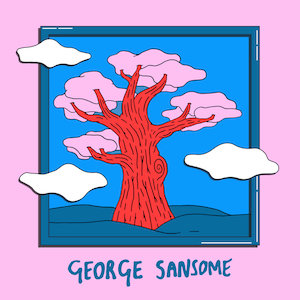
George Sansome – George Sansome
Grimdon Records (GRICD002) – 26 June 2020
While still a part of Granny’s Attic, George Sansome is now striking out solo with this Ben Walker-produced debut album of traditional folk songs set to just voice, guitar and, on the opening track, Tom Bailey’s droning double-bass. The track in question, gathering potency as it builds, is Collier Lass, taken from Roy Palmer’s 1974 book Poverty Knock. Sansome was drawn to its less heard female perspective on the demands and dangers of a miner’s life. Here, she is looking to find a way out of the pit through marriage, even if her initial bid falls on disinterested ears.
Following in the tradition of stalwart folk names such as Martin Carthy, Bert Jansch, Pete Coe and Alice Jones, these are unvarnished back to basics readings, second up being The Bold Princess Royal. He learned it from a version by Bob Copper, which, in suitably rousing manner, recounts the true story of a 1798 encounter between the titular packet ship and a French privateer, the former, outgunned emerging, badly damaged, but victorious and with no loss of life.
Just as you can’t have a traditional folk album without a song about the navy, so to a transportation ballad is obligatory. Filling the slot is Australia, from the singing of the late Sussex folkie Bob Hart, though its origins lie in the 18th-century evergreen Virginny, Sansome affording it an appropriately wistful tone as the narrator reflects on his lot.
A more obscure choice is The Bleaches So Green, a song collected in Newfoundland with the title likely a corruption of the Scottish ballad The Braes Of Strathblane from which it takes its story of linen being pegged out on the banks of Blane Water for bleaching. Returning to more familiar fare, Bonaparte’s Departure For St. Helena, learned from a live Nic Jones recording, trades under a variety of titles. Still, they all relate to the defeated Emperor’s second and final exile, understandably the interpretation here reflecting his “heart full of woe” as he thinks of his (second) wife, Louisa.
As per the title, Jovial Cutler, again from Poverty Knock, is far more musically upbeat even if the lyrics find the Cutler’s wife complaining about her husband insisting on continuing to take Saint Monday off in defiance of the new Industrial Revolution working patterns, staying home drinking while she’s got nowt to wear.
Collected by Cecil Sharp, telling of how a noble lord passes himself off as simple yokel to woo the maid he’s set his heart upon, this tumbling melodic take on Bold Fisherman (which can be a bit of a dirge) embraces lyrics culled from assorted variants. The tradition is, of course, full of takes of young maidens being seduced and abandoned by unfaithful naval or military types, so it makes a change to hear the deftly fingerpicked Gown Of Green, in which a soldier, now wealthy, chances to encounter the woman with whom he had a roll in the grass and left with child and offers to marry her.
The military and marriage account for the final two numbers, first up being The Rebel Soldier, an anti-war song about a Confederate soldier pining for home, collected by Cecil Sharp in Virginia but here amalgamating lyrics from The Poor Stranger (aka Sweet England), also collected by Sharp, but in Kentucky.
It ends with the six-minute When Shall I Get Married? from Hammond and Gardiner Manuscripts by FRank Purslow who assembled the song from a variety of fragments. While the narrator’s never specified, it’s generally regarded as a maid’s lament at being unwed, but, as this fine version demonstrates, works equally well as a man feeling that his love gone away and his heart heavy, he may have missed the boat.
While some of his contemporaries seek to reinvent and remodel traditional folk songs, while yet remaining true to their essence, Sansome proves that addressing their bare-bones, as they would have been sung back in the day, can be no less an inspiring and exhilarating experience.
Out on 26 June, pre-order here: https://georgesansome.co.uk/music/george-sansome/

